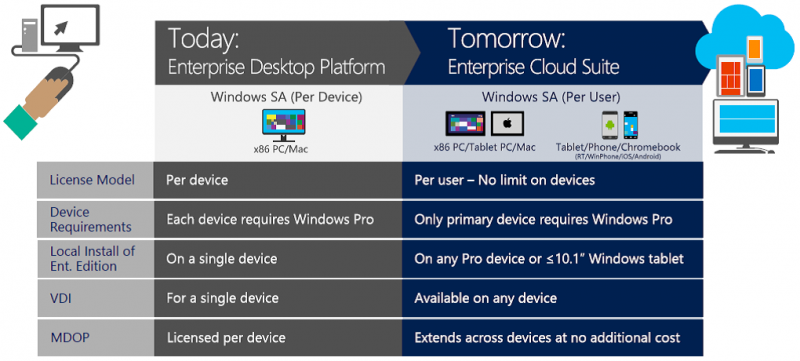Microsoft’s Cleans Its Windows Licensing To Reveal The Path To BYOD
Today’s announcement by Microsoft of a per-user subscription licensing (USL) option for Windows is significant, and good, news for its customers. I’ve been telling Microsoft product managers for years to phase out their obsolete per-device licensing models, and this is a major step in that direction. it marks a major change in Microsoft’s attitude to bring-your-own-device (BYOD) programs involving non-Windows devices such as Apple Macs and Android tablets.

Source: Microsoft
Previously Microsoft tried to discourage customers from using virtual desktop infrastructure (VDI) on top of rival operating systems by applying complex licensing rules involving various TLAs such as RUR, VDA and CSL (which I’m not going to explain here, because they are, thankfully, no longer needed). The USL is far simpler – clear Windows licensing replacing translucent frosted glass, so to speak.
You can learn more about the changes and what they mean for you by reading the report that my colleague Dave Johnson and I published today. We believe that this is a sound move by Microsoft to maintain its dominance of the enterprise desktop market, by making it easier for CIOs to support BYOD programs. You can allow employees to buy the device that they believe best helps them battle irate avians, build virtual cities and/ or watch drug-dealing ex-teachers, and then layer a secure, supportable Windows desktop on top, without having to navigate the previous fog of restrictions on device ownership, type and location.
Coupled with the Windows USL announcement is the enterprise cloud suite (ECS), a typical Microsoft ‘bundle’ of various products at a significant discount to the aggregate a la carte prices. There’s also a transition program to ensure existing customers get fair credit for their previous investment in Windows licenses (Adobe please take note).
Bottom Line: technology management leaders who are setting their organization’s device strategy should take note of Microsoft’s new licensing model. Those of you who previously rejected BYOD and/ or VDI on cost and security grounds should revisit that decision. Microsoft enterprise desktops layered on top of various native operating systems just became much simpler and cheaper.
